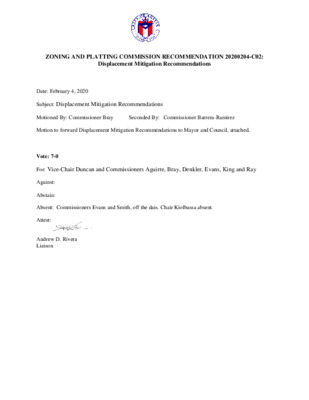20200204-C02: Displacement Mitigation Recommendations — original pdf
Recommendation

ZONING AND PLATTING COMMISSION RECOMMENDATION 20200204-C02: Displacement Mitigation Recommendations Date: February 4, 2020 Subject: Displacement Mitigation Recommendations Motioned By: Commissioner Bray Seconded By: Commissioner Barrera-Ramirez Motion to forward Displacement Mitigation Recommendations to Mayor and Council, attached. For: Vice-Chair Duncan and Commissioners Aguirre, Bray, Denkler, Evans, King and Ray Absent: Commissioners Evans and Smith, off the dais. Chair Kiolbassa absent. Vote: 7-0 Against: Abstain: Attest: Andrew D. Rivera Liaison Zoning and Platting Commission – Affordable Housing Workgroup Recommendations City of Austin Displacement Mitigation Strategies and Programs - February 4, 2020 The Zoning and Platting Commission supports and commends the extensive work of Neighborhood Housing and Community Development (NHCD) staff in developing the displacement mitigation strategies. The following recommendations concern equitable implementation of and adequate funding for NHCD’s displacement mitigation programs. Equitable Implementation - Adequate Funding 1. Significantly increase funding for robust displacement prevention programs focused in neighborhoods identified in the University of Texas Uprooted report. Data produced by the City of Austin Innovation Office i-Team indicates that 232,896 households in Austin are at risk of involuntary displacement. Austin’s annual budget of $7.45 million for displacement mitigation is less than 10% of Seattle’s proposed annual budget of over $78 million for displacement mitigation. 2. Provide a definition for gentrification as it applies to displacement mitigation programs. 3. Utilize median family income (MFI) based on census tracts for displacement mitigation programs. The goal is to help ensure that displacement mitigation programs are more equitable to black and Latino families. A recent report by the University of Texas Latino Studies indicates that the MFI for black and Latino families in Austin is $44,352 and $45,199 respectively while the MFI for white families in Austin is $103,262. The MFI for the population of Austin as a whole is $81,400. An affordable housing density bonus program based on 60% of the MFI for Austin would be serve families earning $48,840, which is above the MFI for black and Latino families in Austin. Include compliance monitoring fees in affordable housing density bonus programs. The fee could be limited to new developments that produce 4 or more affordable units onsite or pay a fee-in-lieu for one or more affordable units. San Diego, CA, and Seattle, WA, have annual monitoring fees for affordable units in their affordable housing density bonus programs. 4. 5. Conduct a comparative analysis of all City of Austin displacement mitigation programs with displacement mitigation programs in peer cities. The analysis should include funding, budgets, administrative costs, number of people served, income-levels served, and renter/homeowner status. 6. Conduct a comparative analysis of all City of Austin displacement mitigation programs for locally-owned small businesses with displacement mitigation programs for locally-owned small businesses in peer cities. The analysis should include funding, budgets, administrative costs, number of small businesses served, annual revenues of small businesses served, and demographics of the owners of small businesses served. 7. Provide a dashboard updated bi-annually for all displacement mitigation programs that includes the following data: a. Budget, source of funding, expenditures, administrative costs for each program. b. Annual cost to monitor compliance with density bonus programs requirements. c. Number people served by each program annually. d. Renter or homeowner. e. Demographic data for each person served by each program: i. MFI level ii. Renter, homeowner, individuals experiencing homelessness iii. Ethnicity iv. Single-parent, family with children, elderly, disabled v. Zip code Page 1 of 2 Zoning and Platting Commission – Affordable Housing Workgroup Recommendations City of Austin Displacement Mitigation Strategies and Programs - February 4, 2020 The following recommendations concern performance and evaluation of NHCD’s strategic priorities, as well as ongoing data needs and management. Performance Measurement To maximize impact of City displacement mitigation resources, establish baseline performance measurement processes for new and existing programs included in NHCD’s Anti-Displacement Strategic Priorities, such as: 1. Evaluate new Preference Policy to ensure new income-restricted units are made available to target income-qualified households, by measuring the number of households identified as eligible, number of households participating in Preference Policy program during its inaugural year, and number of households reached by engagement around program eligibility. Income- qualified households with a tie to the neighborhood should be included in the Preference Policy. 2. Create goals and measures to ensure participation by communities of color in NHCD’s 3. displacement mitigation activities and programs, including marketing on NHCD-subsidized units to people of color. Initiate evaluation process for Community Development Corporation Capacity Building grants, measuring the organization impact of grants. Initiate evaluation process for Tenant Stabilization Contract programs. 4. 5. Track reach of new Housing HUB affordable housing search tool, including number of applications received via tool, housing inquiries received, and number of properties made available via tool. The tool should be accessible to households without access to computers and provided in multiple languages and braille. Applications from income-qualified households with a tie to the neighborhood should be tracked. 6. Continue to develop performance measures and evaluation methodologies as programs grow and evolve. Data Needs and Management Consistent with current methodologies and the University of Texas’ Uprooted study, update geographic data annually to ensure resources reach areas at greatest risk for displacement. Promote Energy Efficiency and Cost Sharing Look into the role of energy efficiency and coordinating with Austin energy to provide energy efficiency improvements for both owner-occupied and rental properties. Examine ways we can create incentives for owners and renters to work with each other and share the cost of energy efficiency improvements. Especially on properties where renter turnover is often high. Approved unanimously by the Zoning and Platting Commission on February 4,2020, with direction to send these recommendations to Austin City Council and City Manager. Page 2 of 2